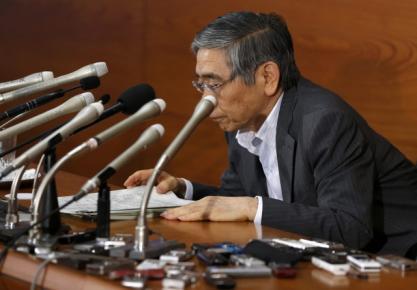BOJ's Sato warns euro area of Japan - style deflation risk
He also brushed aside concerns held by some market players over the slow pace of recovery in exports

He also brushed aside concerns held by some market players over the slow pace of recovery in exports
Bareksa.com - The euro area may face a prolonged period of disinflation that risks harming long-term price expectations, a Bank of Japan policymaker said, warning
that the region should not take lightly the potential danger of slipping into a Japan-style deflationary period.
Japan, on the other hand, has seen inflation pick up faster than expected, Takehiro Sato said, echoing the BOJ governor's view that there was no need now to offer fresh monetary
stimulus.
The European Central Bank is poised to take a series of measures on Thursday to prevent the euro zone from falling into deflation. But its president, Mario Draghi, has stressed that with long-term inflation in the region well anchored, the real chance that consumer prices will enter a declining cycle was
small.
Promo Terbaru di Bareksa
All the same, Sato, a market economist turned BOJ policymaker, countered that view, warning that short- and medium-term inflation expectations in the euro area were already
starting to fall as inflation remained subdued.
"Japan's experience suggests the possibility that low inflation continuing for a long time changes people's inflation expectations in a backward-looking manner, and thus medium- to long-term inflation expectations also lowered adaptively," he told business leaders in Oita, southern Japan, on Thursday.
"The ECB has already revealed its policy stance that it will not hesitate to make use of unconventional measures to address the risk of prolonged disinflation," Sato said. "I therefore am keeping a watchful eye on its future conduct of monetary
policy," he added.
Euro zone inflation has been stuck in what Draghi has called "the danger zone" below 1 percent since October, mainly because of weaker commodity and food prices, but also because of wage and other adjustments in peripheral countries.
Inflation in the United States may also stay lower than levels deemed desirable, partly because growth momentum in the global economy has declined not just due to cyclical influences but structural factors such as a prolonged downturn in demand after the global financial crisis, Sato said.
QQE EFFECT SLOW TO COME
Long-term inflation expectations have remained stable even when Japan was suffering from 15 years of grinding deflation after the collapse of an asset-inflated bubble in the 1990s.
The world's third-largest economy is finally starting to see noticeable gains in consumer prices, with inflation exceeding 1 percent thanks to an economic recovery driven in part by Prime Minister Shinzo Abe's "Abenomics" mix of fiscal and monetary stimulus, and structural reforms.
The monetary stimulus, dubbed "qualitative and quantitative easing" (QQE), was deployed in April last year, when the BOJ pledged to double base money via aggressive asset purchases to achieve its 2 percent inflation target in roughly two years.
Sato has voted for launching QQE, but has argued that 2 percent inflation should not be considered as a rigid target but rather a loose goal with some allowance for deviation.
His proposal has not made headway in the nine-member board. But some BOJ policymakers, including Sayuri Shirai, have voiced reservations about being wedded to the two-year timeframe for meeting the price target, underscoring the differences of opinion on how long the stimulus should be kept in place.
Sato said that while Japan's consumer inflation has overshot his initial projections, that was largely due to rising energy and an overall increase in the import bill from a weak yen, as well as job shortages that were pushing up wages.
That may be different from the kind of price growth the BOJ is aiming for, which ought to be one accompanied by a more balanced and sustainable economic recovery, he said.
"Wage increases induced by tighter labour conditions are a profit-squeezing factor and thus not preferable for firms," he said. "If corporate profits are constrained by labour costs,
business fixed investment will be restricted" and could make any wage rises short-lived, Sato added.
He also cautioned there was no clear evidence yet that the QQE's intended transmission channels -- shift of funds out of safe-haven assets to risky investment and consumer price rises transferring to heightened inflation expectations -- are working effectively in the economy.
But other channels of the BOJ's stimulus programme, such as the effect of lowering borrowing costs, have helped Japan make steady progress in reaching the price goal, Sato said in a news conference after the meeting in Oita.
He also brushed aside concerns held by some market players over the slow pace of recovery in exports, particularly to Asian markets, saying that improvements in advanced economies and expected stable growth in China will underpin shipments ahead.
"I don't think risks (to the economy) have materialised. Therefore I don't see the need now to adjust policy," he said.
BOJ Governor Haruhiko Kuroda has repeatedly voiced confidence that Japan can achieve the price target during the next fiscal year beginning in April 2015, forcing markets to
scale back expectations of additional near-term monetary easing.
But Kuroda has also been at pains to emphasise the central bank's readiness and resolve to take further steps if risks threaten achievement of its policy goals. (Source : Reuters)
Pilihan Investasi di Bareksa
Klik produk untuk lihat lebih detail.
| Produk Eksklusif | Harga/Unit | 1 Bulan | 6 Bulan | YTD | 1 Tahun | 3 Tahun | 5 Tahun |
|---|---|---|---|---|---|---|---|
Trimegah Dana Obligasi Nusantara autodebet | 1.210,58 | ||||||
STAR Stable Amanah Sukuk autodebet | 1.190,48 | - | - | ||||
Syailendra Sharia Fixed Income Fund Kelas A | 1.162,65 | - | - | ||||
Eastspring Syariah Mixed Asset Fund Kelas A | 1.048,49 | - | - | - | - |

Produk Belum Tersedia
Ayo daftar Bareksa SBN sekarang untuk bertransaksi ketika periode pembelian dibuka.
